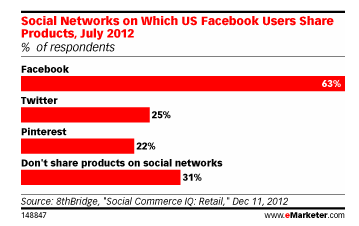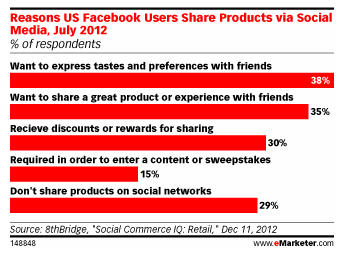For many Americans, social media networks like Facebook are sources of entertainment, while brands continue to push marketing material on users. The result of this obvious disconnect between what consumers look for on social platforms and what marketers publish remains an obstacle that professionals must overcome. Of course, social media marketing is an inevitable practice, so consumers should also alter their perception of what Facebook, Twitter and every other platform will look like moving forward.
 In early 2012, several early adopters of Facebook stores closed their doors, which influenced other brands that considered entering the world of fcommerce (Facebook commerce). However, social media can help brands build awareness and loyalty, as long as marketers understand how to put custom content in front of consumers without annoying them too greatly. It all starts with a strategic social media content creation game plan and a clear understanding of the type of media that grabs consumers’ attention.
In early 2012, several early adopters of Facebook stores closed their doors, which influenced other brands that considered entering the world of fcommerce (Facebook commerce). However, social media can help brands build awareness and loyalty, as long as marketers understand how to put custom content in front of consumers without annoying them too greatly. It all starts with a strategic social media content creation game plan and a clear understanding of the type of media that grabs consumers’ attention.
In July 2012, U.S. social commerce service provider 8thBridge discovered that a substantial number of Americans do not share information about products they own, would like to own or dislike on social networks. But the study also noted that those who do share content via their accounts prefer Facebook as their main platform, and brands that populate this site could see greater engagement as this trend increases, especially if they have active presences.
 According to the source, 63 percent of Americans preferred to alert their friends and family to products on Facebook. Twenty-five percent indicated they used Twitter to achieve the same gain. The main challenge that most marketers face when attempting to build awareness via social media continues to be their inability to identify motivational factors. Fortunately, 8thBridge outlines a few in its study.
According to the source, 63 percent of Americans preferred to alert their friends and family to products on Facebook. Twenty-five percent indicated they used Twitter to achieve the same gain. The main challenge that most marketers face when attempting to build awareness via social media continues to be their inability to identify motivational factors. Fortunately, 8thBridge outlines a few in its study.
The report found that 38 percent of respondents chose to talk up products as a way to share their personal tastes with their networks. This was followed by user-generated content aimed at praising or trashing a product or experience. While these discoveries provide brands with insight into what drives word-of-mouth marketing via Facebook, brands may not understand how to leverage the findings for greater conversions.
By incorporating social buttons on ecommerce spaces, and asking prospective and current customers to share their thoughts with friends and family via their own networks, user-generated content increases. This event also encourages other users to engage in social chatter on the web, and drives curious shoppers to branded Facebook Pages. More, if these Pages aren’t optimized or don’t provide supplementary content for research purposes, the experience ends there, and companies lose out on potential sales. This, perhaps, continues to be where Facebook marketing proves its worth.




